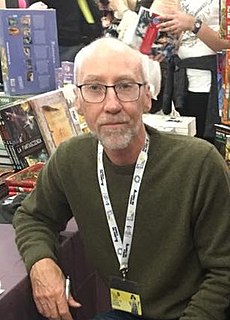A Quote by Lorrie Moore
An author's life is different, complex, and ongoing, while a character's remains frozen in one little story.
Related Quotes
If the point of life is the same as the point of a story, the point of life is character transformation. If I got any comfort as I set out on my first story, it was that in nearly every story, the protagonist is transformed. He's a jerk at the beginning and nice at the end, or a coward at the beginning and brave at the end. If the character doesn't change, the story hasn't happened yet. And if story is derived from real life, if story is just condensed version of life then life itself may be designed to change us so that we evolve from one kind of person to another.
I decided to make myself a little less precious with my storytelling. I think you can see from the first three pieces in the book that I have a long term relationship with the short story as a form and I really love an elegantly crafted story that has several elements that come together in a way that is emotionally complex and different from when we started. That kind of crystalline, perfect, idealized thing that the short story as a genre has come to represent.
I think it would be self-indulgent to go, "Oh, I'm going to make this character different by giving him a quirk of some kind." I don't think that serves the story, particularly. But even very similar scenes with a different set of actors, a different set of circumstances, it starts to evolve as a different character.
Does character develop over time? In novels, of course it does: otherwise there wouldn't be much of a story. But in life? I sometimes wonder. Our attitudes and opinions change, we develop new habits and eccentricities; but that's something different, more like decoration. Perhaps character resembles intelligence, except that character peaks a little later: between twenty and thirty, say. And after that, we're just stuck with what we've got. We're on our own. If so, that would explain a lot of lives, wouldn't it? And also - if this isn't too grand a word - our tragedy.
In novels you're able to occupy character's internal thoughts and it's really hard to do in a film or a TV show. When you're reading a character's thoughts or when it's in first person, you're reading kind of their own story, so you have the opportunity to see what makes that character complex or complicated. And to me that's what the whole point of fiction is.





































